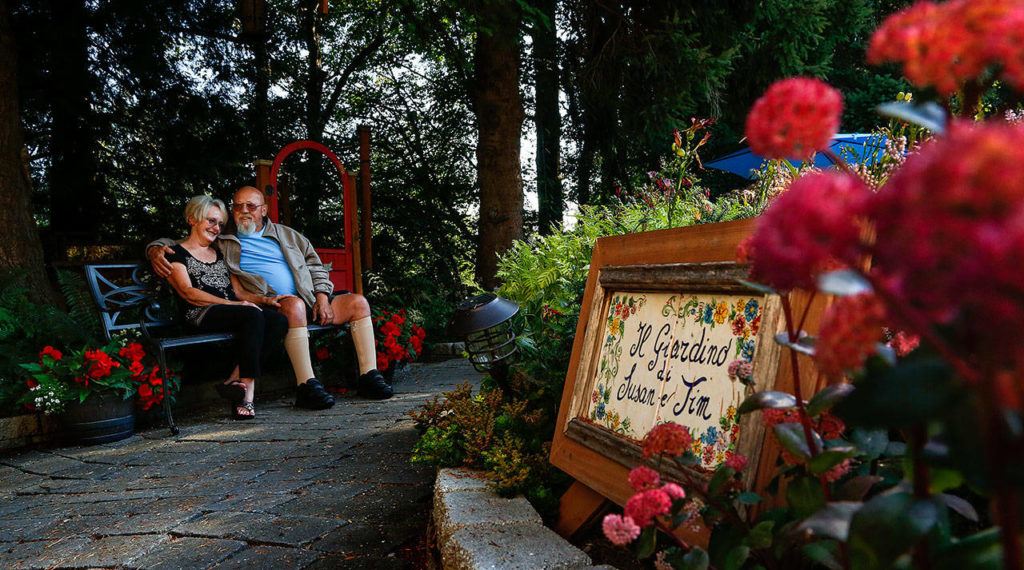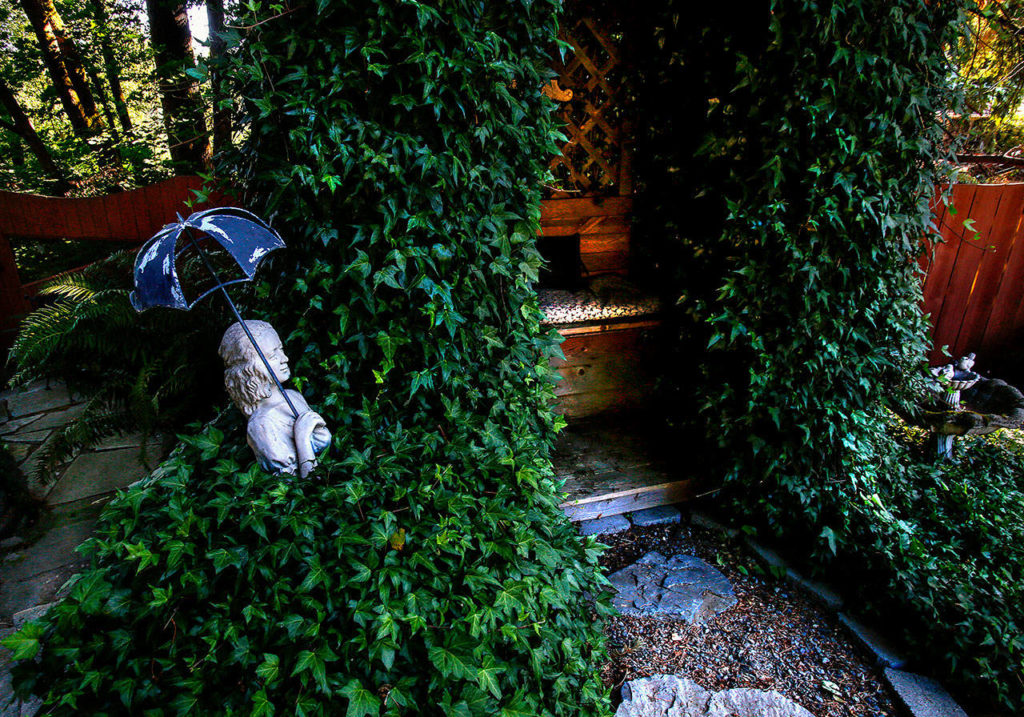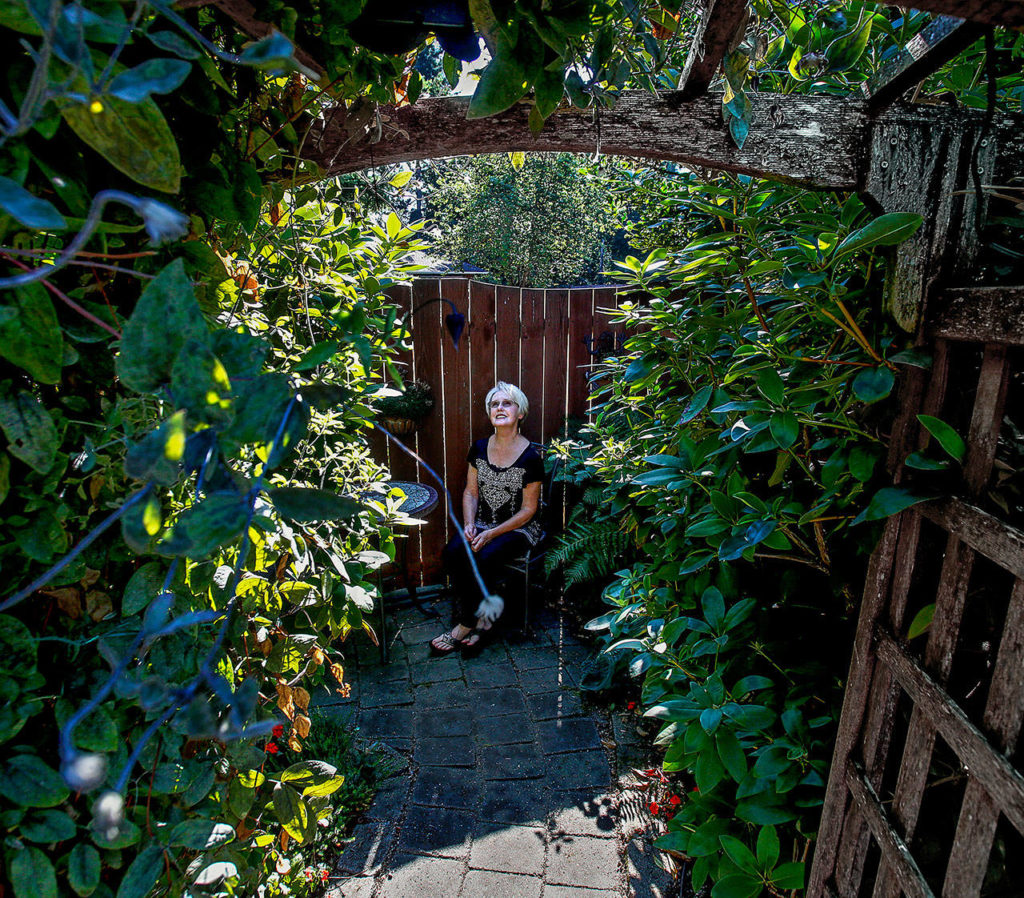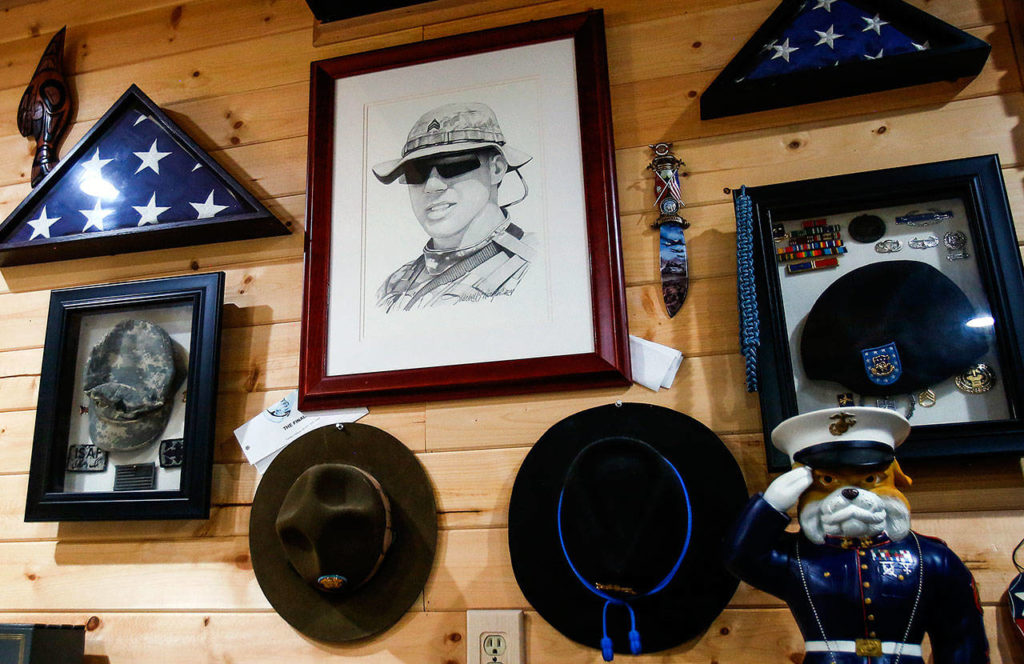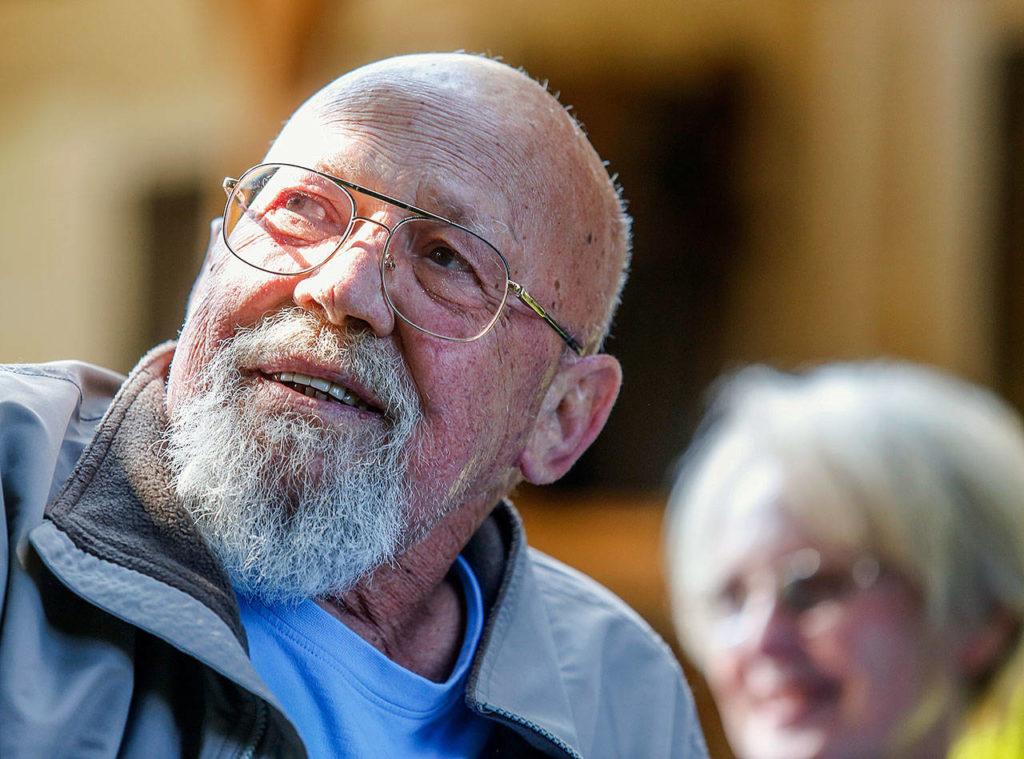MARYSVILLE — Jim Mathis thought joining the Marine Corps would make childhood dreams come true. He signed up in 1962, the year he graduated from Everett High School.
“It was every young boy’s dream — scary but exciting,” said Mathis, 72, who now lives in Marysville with his wife, Susan Hansberry.
He served two tours in Vietnam, in 1965 and 1967, as part of the 2nd Battalion, 9th Marine Regiment, a regiment some labeled “the Walking Dead.” Back home, he had a 37-year career as a lineman for Seattle City Light, Clallam County PUD and other electric utilities.
Yet what became of boyhood dreams of heroism in battle is nightmarish.
“The reality wasn’t good,” Mathis said Tuesday.
He reflected on Vietnam, and on the help he has found at last, as he and his wife enjoyed a sunny morning in the astonishingly beautiful garden they created in their back yard. “This is Jim’s retreat,” said Hansberry, 73, a retired Marysville teacher.
Their yard is many gardens. There’s an ivy-covered “secret garden,” a shade garden where Mathis’ hand-built pine furniture offers a restful hideaway, a bog garden with Venus fly traps, an English garden filled with blooms, a desert garden of cacti, and a Concord grape arbor.
Visitors enter through antique gates, and follow an “imagination trail.” Birdhouses hang from a canopy of tree branches. At the garden’s center is a gazebo, draped with curtains for cool weather.
The toil and beauty have been therapy for Mathis. He suffers from prostate cancer that has spread to his bones, and from diabetes. Both illnesses are among those recognized by the federal Department of Veterans Affairs as being related to exposure to the herbicide Agent Orange in Vietnam.
And 50 years after his homecoming from war, Mathis struggles with post-traumatic stress disorder. For decades, he masked his PTSD with alcohol, and was bedeviled by anger. “When I quit drinking 10 years ago, I thought Jack Daniel’s was going to go out of business,” he said.
Mathis not only bears the physical and psychological burdens brought back from Vietnam, he has endured the loss of a son. Staff Sgt. Mark Mathis, a National Guard soldier, took his life in 2010, several years after returning from Afghanistan. “Mark became a casualty of war,” the Arizona man’s obituary said.
“My son came back from Afghanistan, but didn’t quite make it home,” Mathis said.
He understands war’s lasting damage. When he returned from Vietnam, he trusted no one. He was haunted by guilt. Still, when he has coffee in his garden at 6 a.m., he thinks about “who we lost in that war, and who might have changed the world.”
His previous marriage had long since ended when he rekindled a friendship with Hansberry, an Everett High classmate he had known since they were kids. “His aunt was my mother’s best friend,” Hansberry said. Also divorced, she had been alone 22 years.
In 2004, they began planting and building, creating their sanctuary. They were married in the garden in 2005. It was later the setting for a memorial honoring Mathis’ son.
Along with their garden haven, Mathis has found refuge with other Vietnam veterans. He joins them in a support group every Tuesday at the Everett Vet Center. The VA’s Vet Center Program, with some 300 facilities, provides free counseling and other services to help veterans and their families adjust to life after wartime service.
Even while coping with late-stage cancer, Mathis finds peace in the camaraderie he and other Vietnam veterans share. “Life is wonderful right now, one of the better places I’ve been,” he said. For generations of veterans, from World War II to Afghanistan, he has a message: “Reach out to the Vet Center. Reach out to other people.”
The centers are staffed by masters-level counselors, social workers and marriage and family therapists, said Beth Napolitano, a readjustment counselor at the Everett Vet Center. The help is free. “Everything has been paid for by their service,” she said.
Napolitano said the Everett Vet Center has support groups, typically each with six to eight people, for Vietnam veterans and those from “GWOT,” the global war on terror. Yoga and writing classes, along with support groups for spouses, and a military sexual trauma group are offered.
“The groups are incredibly powerful,” Napolitano said. “That weekly check-in is absolutely lifesaving. For many of them, the only time they leave their home is to come to the Vet Center.”
People might wonder why veterans are so painfully affected by experiences that happened long ago. “We deal here with complex trauma,” Napolitano said. With a single event, such as a car accident, a person can work through it. Being in a war zone for a year or more is very different. “It does stay with a person their whole lifetime. They can learn to manage it,” she said.
Napolitano said PTSD manifests itself in several ways.
First, there is re-experiencing what happened in war. There might be nightmares or flashbacks. “The memories come back like yesterday. It can open a door to the next memory and the next memory,” Napolitano said.
Second is avoidance, through “drinking, drugging, workaholism, anything to bury themselves and avoid the memories,” she said.
“The third part is hypervigilance,” she said. In combat for an extended time, a person’s physiology is more on guard. Later, Napolitano said, there can be “exaggerated startle response, trouble sleeping, and scanning the environment for dangers all the time.”
Overwhelmingly negative thoughts and feelings are also part of PTSD, she said. Mathis said his PTSD, which he denied for much of his life, included bad dreams and sleeplessness, along with drinking.
Troubles may come late in life, especially after retirement. “People think, ‘I was fine for 30 years, why am I falling apart now?’ ” Napolitano said. After years of working, there’s time to dwell on the past. “It’s never too late to come to the VA,” she said.
Mathis said that in his support group, “we don’t talk about the war, mostly we talk about the now.”
In groups she leads, Napolitano hears life-and-death conversations, but also lots of laughter. “We talk about things they live with, dark, deep, scary and upsetting things,” she said. “I tell my groups laughter is some of the best medicine.”
Interests and activities are therapeutic, too. “I love that idea of a garden, channeling it into this beautiful work of art,” Napolitano said. “I’ve seen veterans build ponds and stock them with koi. Movement, writing, nature, fishing, these different means are powerful.”
Mathis said their lush garden started small. “The more I put in, the better I felt. And the better I felt, the more I wanted to put in,” he said. Admittedly no master gardener, he quipped that when one of his grandchildren asked what type of flower something was, he replied “a red one.”
Connections with people — grandchildren, friends, other veterans — also bring healing.
How war really hurts people is its long-term effects on their sense of safety and ability to trust, Napolitano said. A sense of control might also be lost, along with self-esteem.
“Find one person you can trust, one thing you have control over,” Napolitano said.
Mathis is at peace in his garden, but can no longer do the work. Neighbor boys have helped in the yard. Through the VA, stair lifts were installed in their house. Mathis gets around using a mobility scooter. He has two fractured bones, and needs high doses of pain medications.
“He spends a lot of time right out here on the deck,” his wife said.
Earlier this summer, Mathis and Hansberry invited several veterans and their wives for a barbecue and to share their garden. “Sometimes I just want to throw a party and invite the whole world,” Mathis said. They weren’t sure anyone would come. “They did show,” he said.
One guest, Deloris Wigren, of Darrington, described the garden as “out of this world — something I have never seen in my life.”
“He’s just a phenomenal man, and he’s doing everything he can to make it positive, what he’s going through,” Wigren said.
Savoring life now, Mathis has just one big mission. It’s to spread the word to other veterans: “Get in there and get the help.”
Julie Muhlstein: 425-339-3460; jmuhlstein@heraldnet.com.
Help for veterans
The Everett Vet Center offers free support groups for military veterans and spouses, individual counseling, help with veterans benefits, and much more. It is at 3311 Wetmore, Ave., Everett. Hours are 8 a.m.-4:30 p.m. Mondays and Fridays, 8 a.m.-6:30 p.m. Tuesdays through Thursdays, and 8 a.m.-noon Saturdays.
Information: 425-252-9701 or www.va.gov/directory/guide/facility.asp?ID=5611
After-hours help: 877-WAR-VETS (877-927-8387)
Talk to us
> Give us your news tips.
> Send us a letter to the editor.
> More Herald contact information.

